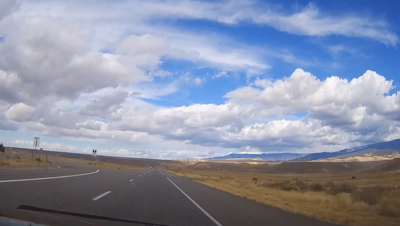Most folks have something they geek out about. One of mine is highway funding.
I can’t say why that is, especially since I’m bad at math and everything in transportation is measured in lane miles, cubic yards and calculated rights of way.
The origin of geek, though, means a fool, and later a carnival worker, so I qualify.
It doesn’t take a rocket scientist, though, to see Colorado is living on borrowed time and, likely, borrowed money, if legislators continue to put off investing significantly in moving goods and people around our fast-growing state.
Those investments have never been more important as Colorado struggles back to its feet in the pandemic’s economic aftermath.
Transportation spending, then, will be an issue worth watching with the new General Assembly that was seated Wednesday. Colorado has 99 problems, but too much asphalt ain't one.
That was true in good economic times and doubly so in the bad times ahead.
Relief money was a relief this month as the Colorado Transportation Commission gave the state highway department the green light to spend $134 million of federal stimulus money. The projects were already atop the 10-year road plan the agency rolled out right before the pandemic hobbled life as we know it last March.
Gov. Jared Polis has also asked the legislature to carve out $220 million for infrastructure this year, along with $105 million for tax relief in his Colorado-based recovery plan.
Polis said the state couldn't afford to waste time jump-starting its economy, creating jobs and reducing traffic. He cited Interstate 76, a lifeline for northeast Colorado, as well as the swervy, bumpy “Delta Dip” stretch of U.S. 50 between Grand Junction and Delta.
He also wants investments in the drive between Denver and Fort Collins, plus a cut of the windfall for local and regional governments.
I thought last summer that state highway director Shoshana Lew would be down in the dumps about the 10-year plan she worked so hard to develop hitting the skids while the state budget recovers from the reeling economy.
Her glass was half full, though: The plan is the fastest way for the state to recover as money becomes available again, Lew told me.
That bet paid off this month. The federal dollars are about the same as the state dollars cut by the legislature last year, when they slashed $3.3 billion from the $13.5 billion general operating budget.
Transportation investments go a long way. Roads and bridges touch everybody. Even if you don’t commute to work or even own a vehicle, those groceries in your mouth got there somehow. Neither public schools nor private prisons have that kind of reach.
A bad road can't be called a public good.
Given all the fiscal sinkholes government fills, transportation never gets as much as it gives.
“I think it’s absolutely part of the story,” Lew told me in a phone chat late last week, when I brought up the road to recovery.
“Transportation can be part of helping our economy in so many ways, including helping Main Street, as well as taking care of the key freight corridors where so many goods and people move and the actual jobs that come from building transportation.”
It's the Keynesian loop: Government investment fuels growth, which generates prosperity and materialistic happiness, which generates more tax revenue.
Any argument to the counter is based on pixie dust and political donors.
Relief is a short-term fix, however.
A new transportation-focused business coalition called A Way Forward plans to urge lawmakers to invest wisely on recovery.
Tony Milo, the executive director at the Colorado Contractors Association, said the first step is for both sides of the aisle to get with the governor on name infrastructure as a priority.
"Our group is solutions-oriented and working closely with stakeholders and legislative leaders to develop a plan that will provide a long term, sustainable funding source to address our transportation infrastructure,” he teased.
I caught up with Senate Republican leader Chris Holbert of Parker on the issue last month. I know him to be an advocate for transportation.
Two years ago he and another bright mind I admire, Senate Majority Leader Steve Fenberg of Boulder, worked out a bipartisan deal to put $300 million into transportation, a rabbit that can't be pulled out of another hat this year, Holbert told me.
Republicans typically support more investments in roads and bridges, but now some are questioning if money is being spent wisely on engineering and contracts, he said.
“If those things are true, I can’t imagine why anyone would want to talk about raising taxes to pour more money into CDOT,” Holbert said. “And we certainly don't have the money in the budget.”
But new money can only come in three ways: from Uncle Sam, from loans or from the back pockets of taxpayers.
Democrats resist such debt, because in lean times, lawmakers might have to decide between making the payments and paying for schools.
Like the geek that I am, I like to game out the Rube Goldberg machinations that turn public dollars into public good, though I often come up short, because I can’t do government math.
But one thing I know for sure: Doing nothing is a bad deal for Colorado's economy. You can take that to the bank.







(0) comments
Welcome to the discussion.
Log In
Keep it Clean. Please avoid obscene, vulgar, lewd, racist or sexually-oriented language.
PLEASE TURN OFF YOUR CAPS LOCK.
Don't Threaten. Threats of harming another person will not be tolerated.
Be Truthful. Don't knowingly lie about anyone or anything.
Be Nice. No racism, sexism or any sort of -ism that is degrading to another person.
Be Proactive. Use the 'Report' link on each comment to let us know of abusive posts.
Share with Us. We'd love to hear eyewitness accounts, the history behind an article.